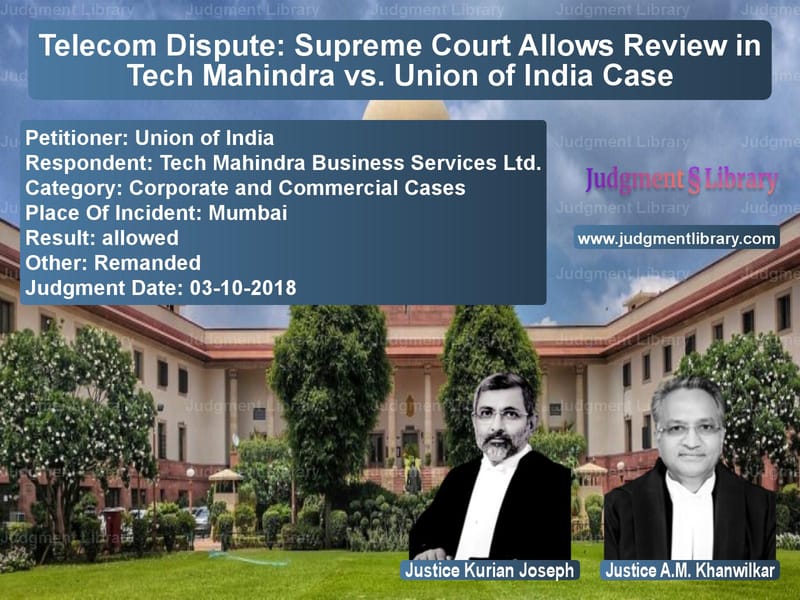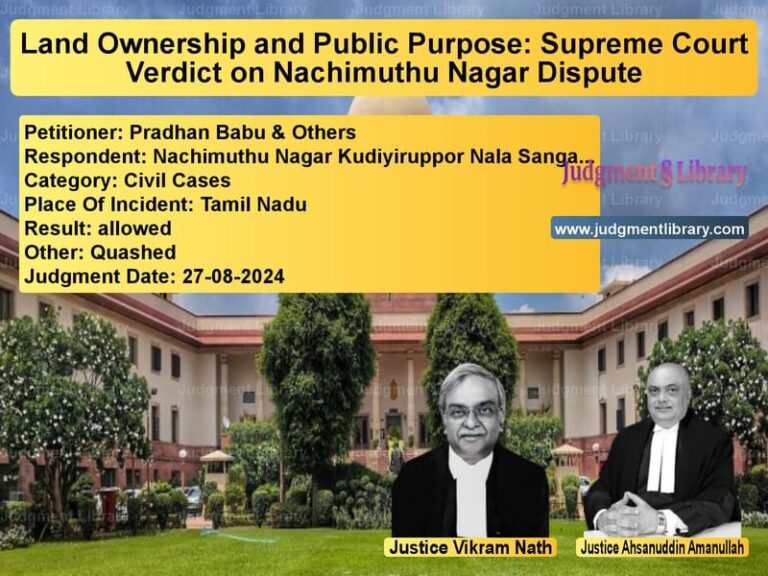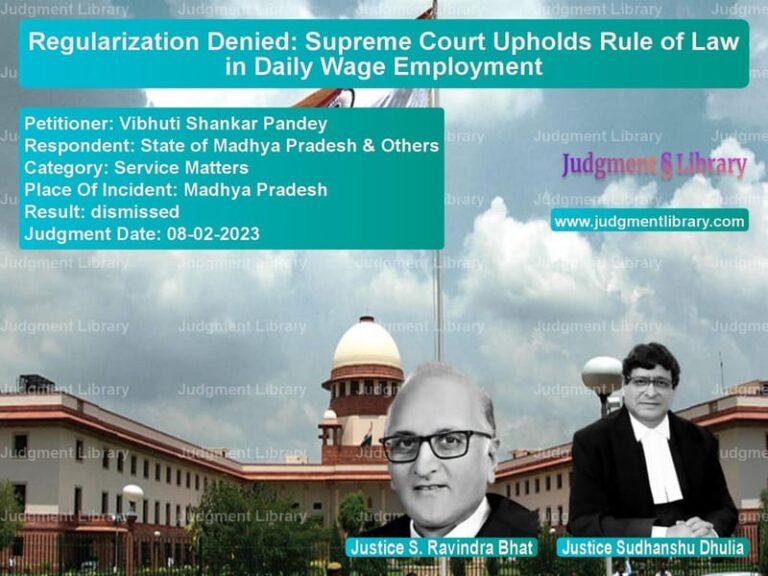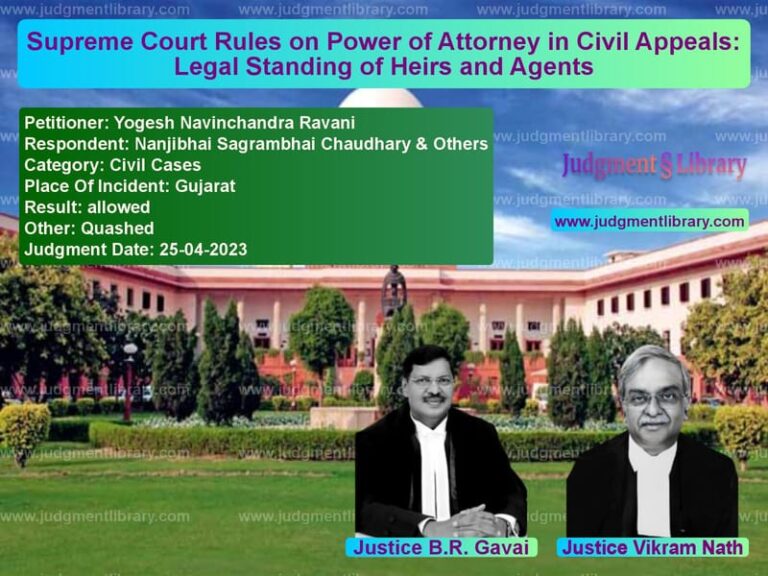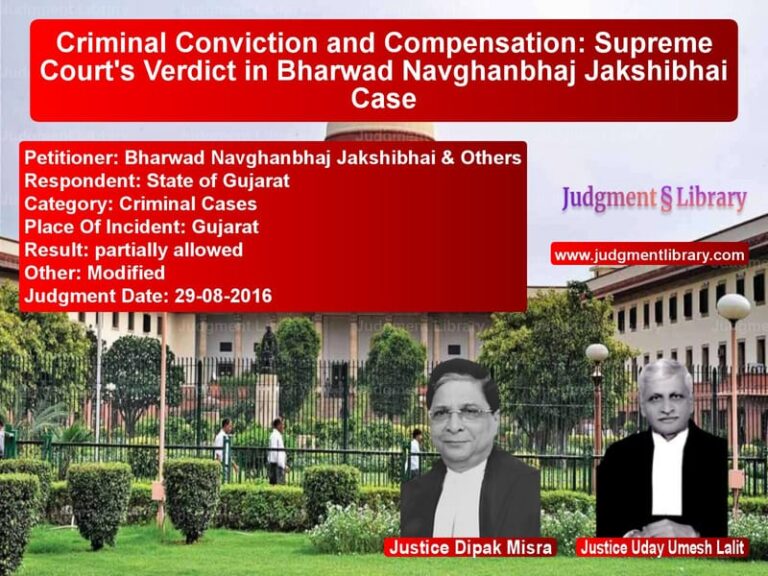Telecom Dispute: Supreme Court Allows Review in Tech Mahindra vs. Union of India Case
The Supreme Court of India, in a significant judgment, addressed a long-standing dispute between Tech Mahindra Business Services Ltd. (formerly Hutchinson Global Services Ltd.) and the Union of India regarding a show-cause notice issued over alleged unauthorized use of telecom resources. The case, which originated from a demand of Rs. 6.11 crore by the Department of Telecommunications (DoT), was challenged by Tech Mahindra before the Bombay High Court and later adjudicated by the Telecom Disputes Settlement and Appellate Tribunal (TDSAT). Ultimately, the Supreme Court allowed the Union of India to seek a review of the TDSAT order, provided sufficient legal backing was presented.
Background of the Case
The dispute arose when the DoT issued a show-cause notice to Tech Mahindra on February 27, 2013, alleging unauthorized telecom usage. The company challenged this notice in the Bombay High Court, which ruled that while the company could be directed to pay compensation for any proven loss to the government, it could not be asked to furnish an unconditional undertaking. The High Court clarified:
- “If the petitioner is directed to deposit the amounts determined to be the loss to the DoT/Government of India due to unauthorized telecom resources being used, it would be bound to do so and its failure to do so would be met with the consequences as per law.”
- “The petitioner shall not be required to furnish an unconditional undertaking as demanded.”
- “The show-cause notice remains outstanding, and a personal hearing has been granted to the petitioner.”
Proceedings Before TDSAT
Following the High Court ruling, the DoT proceeded with its investigation and, after hearing Tech Mahindra’s response, issued a fresh demand order on July 14, 2014, for a sum of Rs. 6,11,73,460. The amount included:
- License fee loss
- Penalty
- Interest charges from April 2007 to June 2014
Tech Mahindra challenged this order before the TDSAT, which found serious flaws in the calculation of loss by DoT:
- “The respondent has erred in calculating the loss using the ceiling rate provided in an order issued in 2005, despite the continuous fall in telecom rates.”
- “It is not fair to use the highest percentage prescribed under the UASL License to calculate the license fee, interest, and penalty.”
- “If an ordinary subscriber had made a similar mistake, only a fine under the Telegraph Rules could have been imposed.”
TDSAT’s Final Decision
Despite these findings, the tribunal, in an attempt to balance interests, ruled:
- The loss should be calculated based on payments made by Tech Mahindra to M/s Tata Communications Ltd. for similar bandwidth.
- For periods prior to 2010, the highest payment recorded for any year (Rs. 12,96,056 for 2012) should be used as a benchmark.
- The license fee that Tata Communications Ltd. would have paid should be taken as the license fee loss.
- Interest at 10% should be charged on the due license fee.
Arguments Before the Supreme Court
Union of India’s Arguments
- The government contended that it had the legal authority to impose penalties and interest based on existing notifications and rules.
- The calculations were made according to the regulations under the Unified Access Service License (UASL).
- The tribunal’s decision to use an alternative calculation method deviated from the licensing framework.
Tech Mahindra’s Arguments
- The company argued that the DoT had arbitrarily calculated losses using outdated tariff ceilings from 2005.
- It emphasized that TDSAT’s revised calculation was fairer and better reflected actual payments made.
- The company maintained that the excessive penalty was unfair and beyond the regulatory scope.
Supreme Court’s Ruling
The Supreme Court observed that the central issue was whether the government had the legal authority to impose penalties and interest as claimed. However, the Court found that the government had failed to present concrete legal materials before the TDSAT justifying its calculations.
The Court, therefore, ruled:
- “In case there are such materials having the force of law, it is for the appellant to approach the Tribunal and seek review.”
- “The appeal is disposed of, and a period of thirty days is granted to the appellant to do the needful.”
- “If no review is filed within thirty days, the amounts deposited by the respondent shall be refunded with an interest rate of 10% per annum.”
- “If a review is filed, the Tribunal should dispose of the same expeditiously, preferably within six months.”
Implications of the Judgment
This ruling has broad implications for both telecom service providers and regulatory authorities:
- Judicial Oversight on Telecom Regulations: The Supreme Court has reinforced that government agencies must have clear legal backing for imposing penalties and interest.
- Relief for Private Telecom Companies: The judgment ensures that service providers are not subjected to arbitrary and excessive financial demands.
- Regulatory Accountability: The ruling compels the DoT and similar bodies to establish transparent calculation methods and avoid reliance on outdated metrics.
Conclusion
The Supreme Court’s decision in Union of India vs. Tech Mahindra Business Services Ltd. is a landmark ruling that upholds fairness in telecom dispute resolution. By granting the government an opportunity to present its case with proper legal backing, while ensuring Tech Mahindra’s rights are protected, the Court has struck a balance between regulatory enforcement and corporate accountability. This case serves as a precedent for future telecom disputes, reinforcing the importance of clear regulations and fair adjudication processes.
Petitioner Name: Union of India.Respondent Name: Tech Mahindra Business Services Ltd..Judgment By: Justice Kurian Joseph, Justice A.M. Khanwilkar.Place Of Incident: Mumbai.Judgment Date: 03-10-2018.
Don’t miss out on the full details! Download the complete judgment in PDF format below and gain valuable insights instantly!
Download Judgment: Union of India vs Tech Mahindra Busine Supreme Court of India Judgment Dated 03-10-2018.pdf
Direct Downlaod Judgment: Direct downlaod this Judgment
See all petitions in Company Law
See all petitions in Corporate Compliance
See all petitions in unfair trade practices
See all petitions in Judgment by Kurian Joseph
See all petitions in Judgment by A M Khanwilkar
See all petitions in allowed
See all petitions in Remanded
See all petitions in supreme court of India judgments October 2018
See all petitions in 2018 judgments
See all posts in Corporate and Commercial Cases Category
See all allowed petitions in Corporate and Commercial Cases Category
See all Dismissed petitions in Corporate and Commercial Cases Category
See all partially allowed petitions in Corporate and Commercial Cases Category

